Background
Ken Albala was born as Kenneth Albala on November 3, 1964, in New York City, New York, United States. He is the son of Albert and Phyllis Albala.

Yale University, New Haven, CT 06520, United States
Yale University where Ken Albala received his Master of Arts degree.
Columbia University, New York, NY 10027, United States
Columbia University where Ken Albala received his Doctor of Philosophy degree.
2121 I St NW, Washington, DC 20052, United States
The George Washington University where Ken Albala received his Bachelor of Arts degree.
20 Church Ln, Manalapan Township, NJ 07726, United States
Manalapan High School where Ken Albala studied.





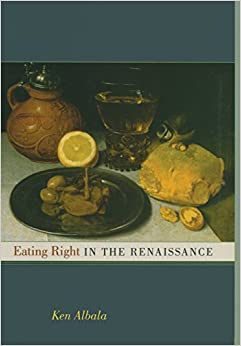
(Eating right has been an obsession for longer than we thi...)
Eating right has been an obsession for longer than we think. Renaissance Europe had its own flourishing tradition of dietary advice. Then, as now, an industry of experts churned out diet books for an eager and concerned public. Providing a cornucopia of information on food and an intriguing account of the differences between the nutritional logic of the past and our own time, this inviting book examines the wide-ranging dietary literature of the Renaissance. Ken Albala ultimately reveals the working of the Renaissance mind from a unique perspective: we come to understand people through their ideas on food. Eating Right in the Renaissance takes us through an array of historical sources in a narrative that is witty and spiced with fascinating details.
https://www.amazon.com/Eating-Right-Renaissance-Ken-Albala/dp/0520229479/ref=sr_1_19?dchild=1&keywords=ken+albala&qid=1601488725&sr=8-19
2002
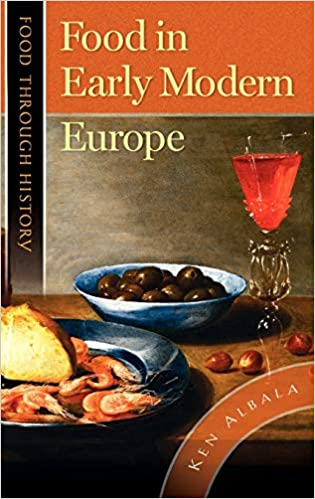
(Food in Early Modern Europe examines food's importance du...)
Food in Early Modern Europe examines food's importance during the massive evolution of Europe following the Middle Ages. Food historian Ken Albala has written the perfect book for students and other readers interested in the myriad aspects of food in early modern Europe. This guide also includes many period recipes, never before available in English, along with evocative illustrations and a timeline.
https://www.amazon.com/Early-Modern-Europe-through-History/dp/0313319626/ref=sr_1_15?dchild=1&keywords=ken+albala&qid=1601488725&sr=8-15
2003
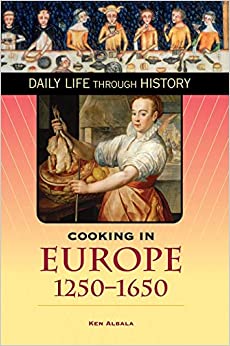
(The cookbook Cooking in Europe, 1250-1650 presents 171 un...)
The cookbook Cooking in Europe, 1250-1650 presents 171 unadulterated recipes from the Middle Ages, Renaissance, and Elizabethan eras. Most are translated from French, Italian, or Spanish into English for the first time. Some English recipes from the Elizabethan era are presented only in the original if they are close enough to modern English to present an easy exercise in translation. Expert commentary helps readers to be able to replicate the food as nearly as possible in their own kitchens.
https://www.amazon.com/gp/product/0313330964/?tag=2022091-20
2006
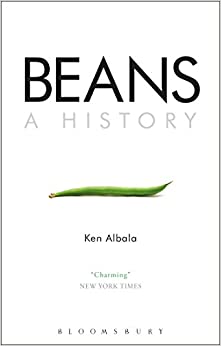
(This is the story of the bean, the staple food cultivated...)
This is the story of the bean, the staple food cultivated by humans for over 10,000 years. From the lentil to the soybean, every civilization on the planet has cultivated its own species of bean. Beans: A History takes the reader on a fascinating journey across cuisines and cultures.
https://www.amazon.com/Beans-History-Ken-Albala/dp/1845204301/ref=sr_1_11?dchild=1&keywords=ken+albala&qid=1601488725&sr=8-11
2007
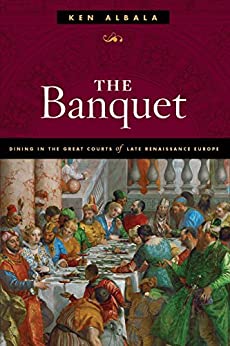
(The importance of the banquet in the late Renaissance is ...)
The importance of the banquet in the late Renaissance is impossible to overlook. Banquets showcased a host's wealth and power, provided an occasion for nobles from distant places to gather together, and even served as a form of political propaganda. But what was it really like to cater to the tastes and habits of high society at the banquets of nobles, royalty, and popes? What did they eat and how did they eat it? In The Banquet, Ken Albala covers the transitional period between the heavily spiced and colored cuisine of the Middle Ages and classical French Haut cuisine.
https://www.amazon.com/Banquet-Dining-Courts-Renaissance-Europe-ebook/dp/B0773KJ6VV/ref=sr_1_18?dchild=1&keywords=ken+albala&qid=1601488725&sr=8-18
2007
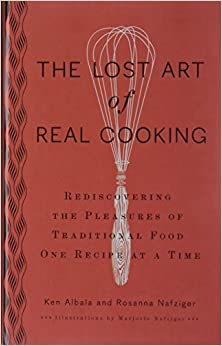
(The Lost Art of Real Cooking heralds a new old-fashioned ...)
The Lost Art of Real Cooking heralds a new old-fashioned approach to food - laborious and inconvenient, yet extraordinarily rewarding and worth bragging about. From jam, yogurt, and fresh pasta to salami, smoked meat, and strudel, Ken Albala and Rosanna Nafziger arm you with the knowledge and skills that let you connect on a deeper level with what goes into your body.
https://www.amazon.com/Lost-Art-Real-Cooking-Rediscovering/dp/0399535888/ref=sr_1_2?dchild=1&keywords=ken+albala&qid=1601488725&sr=8-2
2010
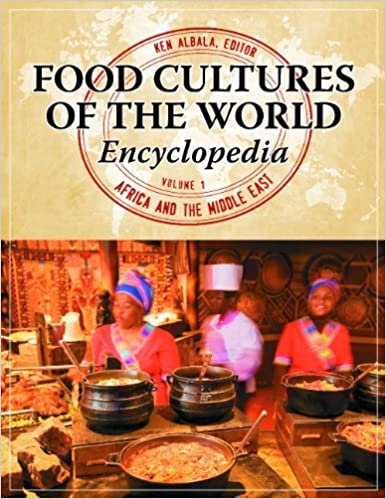
(This comprehensive reference work introduces food culture...)
This comprehensive reference work introduces food culture from more than 150 countries and cultures around the world - including some from remote and unexpected peoples and places. From babka to baklava to the groundnut stew of Ghana, food culture can tell us where we've been - and maybe even where we're going. Filled with succinct, yet highly informative entries, Food Cultures of the World Encyclopedia covers all of the planet's nation-states, as well as various tribes and marginalized peoples.
https://www.amazon.com/Food-Cultures-World-Encyclopedia-Albala-ebook/dp/B00EQ7HVTG/ref=sr_1_14?dchild=1&keywords=ken+albala&qid=1601488725&sr=8-14
2011
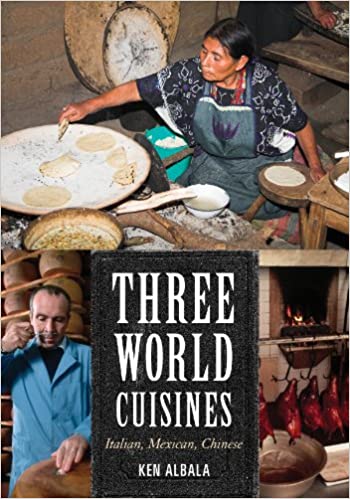
(The text begins with a comprehensive theory of cuisine in...)
The text begins with a comprehensive theory of cuisine in the introduction and moves to the parallel culinary histories of Italy, Mexico, and China: the independent domestication of crops in each, the social, political, and technological developments that gave rise to each cuisine, and cooking in both professional and home settings. It also compares the internal logic of the cooking style and techniques in a way that will resonate with students. Albala also challenges the notion of authenticity, providing ample evidence that cuisines are constantly evolving, adapting over time according to ingredients and cooking technologies.
https://www.amazon.com/Three-World-Cuisines-Littlefield-Gastronomy-ebook/dp/B008UTMN6M/ref=sr_1_5?dchild=1&keywords=ken+albala&qid=1601488725&sr=8-5
2012
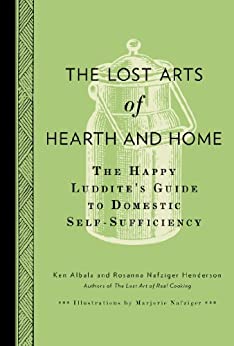
(The Lost Arts of Hearth and Home is not about extreme, of...)
The Lost Arts of Hearth and Home is not about extreme, off-the-grid living. It's for the city and suburban dwellers with day jobs: people who love to cook, love fresh natural ingredients, and old techniques for preservation, people who like doing things themselves with a needle and thread, garden hoe, or manual saw. Ken Albala and Rosanna Nafziger Henderson spread the spirit of antiquated self-sufficiency throughout the household. They offer projects that are decidedly unplugged and a little daring.
https://www.amazon.com/Lost-Arts-Hearth-Home-Self-Sufficiency-ebook/dp/B008EXO5D8/ref=sr_1_10?dchild=1&keywords=ken+albala&qid=1601488725&sr=8-10
2012
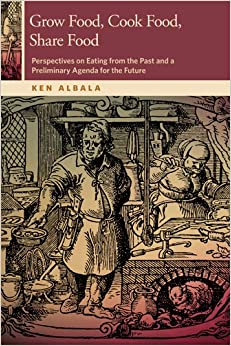
(Grow Food, Cook Food, Share Food is a practical food hist...)
Grow Food, Cook Food, Share Food is a practical food history lesson, an editorial on our use of packaged convenience foods, and a call to arms - of the kitchen variety. Mixing food writing and history, adding a dash of the cookbook, author and scholar Ken Albala shares the story of what happened when he started taking food history seriously and embarked on a mission to grow, cook, and share food in the ways that people did in the past.
https://www.amazon.com/Grow-Food-Cook-Share-Perspectives/dp/0870717189/ref=sr_1_1?dchild=1&keywords=ken+albala&qid=1601488633&sr=8-1
2013
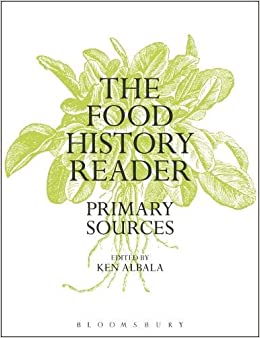
(With the proliferation of food history courses and avid i...)
With the proliferation of food history courses and avid interest among scholars and the general public, the need for a solid comprehensive collection of key primary texts about the food of the past is urgent. This collection spans the globe from classical antiquity to the present, offering substantive selections from cookbooks, fiction, gastronomic and dietary treatises, and a wide range of food writing. Offering a solid introduction to each period with extensive commentary and suggestions for interpretive strategies, this reader provides extracts undigested, for the student who needs immediate and direct contact with the ideas of the past.
https://www.amazon.com/Food-History-Reader-Primary-Sources/dp/0857854135/ref=sr_1_3?dchild=1&keywords=ken+albala&qid=1601488725&sr=8-3
2013
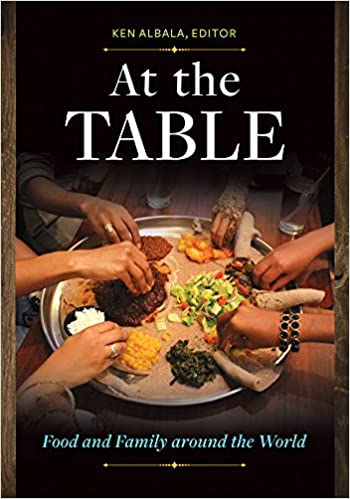
(What's for dinner? Not just in America, but around the wo...)
What's for dinner? Not just in America, but around the world? And how is it cooked, what's the historical significance of that food, how is it served and consumed, and who gets to clean up? This book provides a fascinating insight into how dinner is defined in countries around the world.
https://www.amazon.com/At-Table-Family-around-World-ebook/dp/B01CYUPTFY/ref=sr_1_16?dchild=1&keywords=ken+albala&qid=1601488725&sr=8-16
2016
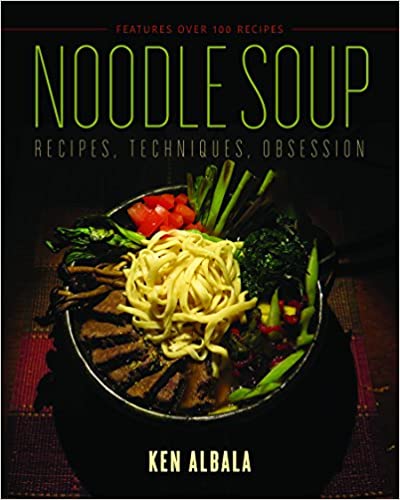
(Every day, noodle shops around the globe ladle out quick ...)
Every day, noodle shops around the globe ladle out quick meals that fuel our go-go lives. But Ken Albala has a mission: to get the reader in the kitchen making noodle soup. This primer offers the recipes and techniques for mastering quick-slurper staples and luxurious from-scratch feasts.
https://www.amazon.com/Noodle-Soup-Recipes-Techniques-Obsession/dp/0252083180/ref=sr_1_4?dchild=1&keywords=ken+albala&qid=1601488725&sr=8-4
2017
Ken Albala was born as Kenneth Albala on November 3, 1964, in New York City, New York, United States. He is the son of Albert and Phyllis Albala.
Ken Albala, after graduation from Manalapan High School in 1982, began his studies at the George Washington University where he received a Bachelor of Arts degree with distinction in early modern European studies in 1986. Then he obtained a Master of Arts degree in Tudor and Stuart history from Yale University in 1987. In 1993 he got a Doctor of Philosophy degree in Renaissance history/food from Columbia University.
Ken Albala joined Columbia University in 1990 as a preceptor in history, a position he held till 1993, the year he was an adjunct instructor in history at the New School for Social Research. Then he went to the University of the Pacific where he was an assistant professor from 1994 till 2000. In that same year, he became an associate professor of history, growing to the post of a professor of history. In 2002 he became chair of the department and held this position till 2006.
During his years at the University of the Pacific, Albala was also a member of the Committee for Academic Planning and Development, Curriculum Committee, Mentor I Planning Committee, Academic Council, University Awards Committee, Humanities Center, Honors Program Committee, Gender Studies Board and Tenure Review Committee. For some years, he also chaired the Committee for Academic Planning and Development, University Awards Committee, History Department Search Committee and Humanities Center and acted as a member and interviewer of the History Department Search Committee, as well as a member and chair of Tenure Review Committee.
Albala is the author of books on food and diet in fifteenth-to-seventeenth-century Europe. In Eating Right in the Renaissance, Albala divides the appearance of expert dietary texts in Europe into three time periods: the 1470s to 1530, 1530 to the 1570s, and the 1570s to 1650. Albala followed Eating Right in the Renaissance with Food in Early Modern Europe, an authoritative work on the importance of food to Europeans as their culture evolved after the end of the Middle Ages. The author includes early recipes translated from French, German, and Italian, numerous illustrations, and a timeline showing the way diet evolved along with the people.
He also wrote numerous book chapters and articles on dietary theory and practice in historical Europe. Albala is the series editor of Food Culture around the World. He contributed to books, including Food from the Waters, The Encyclopedia of the Renaissance, The Cambridge World History of Food, The Reader's Guide to British History, and The Encyclopedia of Food, and to periodicals, including Gastronomica, Renaissance Quarterly, and Sixteenth Century Studies.
He is a well-known lecturer at conferences in the United States, Canada, and Europe, where he has presented papers on food and nutrition in history as well as modern aspects of diet and health.
Ken Albala is an acknowledged history professor and Renaissance scholar known as a professor of history at the University of the Pacific. He was listed as a notable history professor and writer by Marquis Who's Who. For his teaching activity, he received numerous honors including travel grants from the University of the Pacific (1997, 1998, 2001), the New York Council for the Humanities Grant, Eberhardt Research Grant to Biblioteca Vaticana Apostólica (2003), International Association for Culinary Professionals Martini and Rossi Scholarship (2003), and the Faye and Alex Spanos Distinguished Teaching Award from the University of the Pacific.
His books also received a wide response. Three World Cuisines: Italian, Mexican, Chinese was the winner of the Gourmand World Cookbook Award for the Best Foreign Cuisine Book in the World in 2013. Beans won the 2008 International Association of Culinary Professionals Jane Grigson Award and Cordon d'Or in Food History/Literature.
(The text begins with a comprehensive theory of cuisine in...)
2012(What's for dinner? Not just in America, but around the wo...)
2016(With the proliferation of food history courses and avid i...)
2013(This comprehensive reference work introduces food culture...)
2011(Grow Food, Cook Food, Share Food is a practical food hist...)
2013(The Lost Art of Real Cooking heralds a new old-fashioned ...)
2010(The cookbook Cooking in Europe, 1250-1650 presents 171 un...)
2006(Food in Early Modern Europe examines food's importance du...)
2003(This is the story of the bean, the staple food cultivated...)
2007(Every day, noodle shops around the globe ladle out quick ...)
2017(The importance of the banquet in the late Renaissance is ...)
2007(The Lost Arts of Hearth and Home is not about extreme, of...)
2012(Eating right has been an obsession for longer than we thi...)
2002Quotations: "It may seem monomaniacal, but I teach about food, I write about food, I love to cook, I read about food for leisure - what better recipe is there for happiness than to make work and play completely seamless?"
Ken Albala is a member of the International Association of Culinary Professionals, Renaissance Society of America, 16th Century Studies Association, American Historical Association and Phi Beta Kappa.
Quotes from others about the person
"What an awesome teacher! He knows everything about every food and its industry and history."
"Great professor. He really displays his enthusiasm and passion for the subject and tries to get students' interest level up."
"Professor Albala offers insight into the history of food that is presented in a highly easy-to-appreciate manner. His enthusiasm and genial style stimulate additional thinking and makes for quite a fascinating subject."
Ken Albala married Joanna Schneiderman on August 25, 1992. The marriage produced two children.
